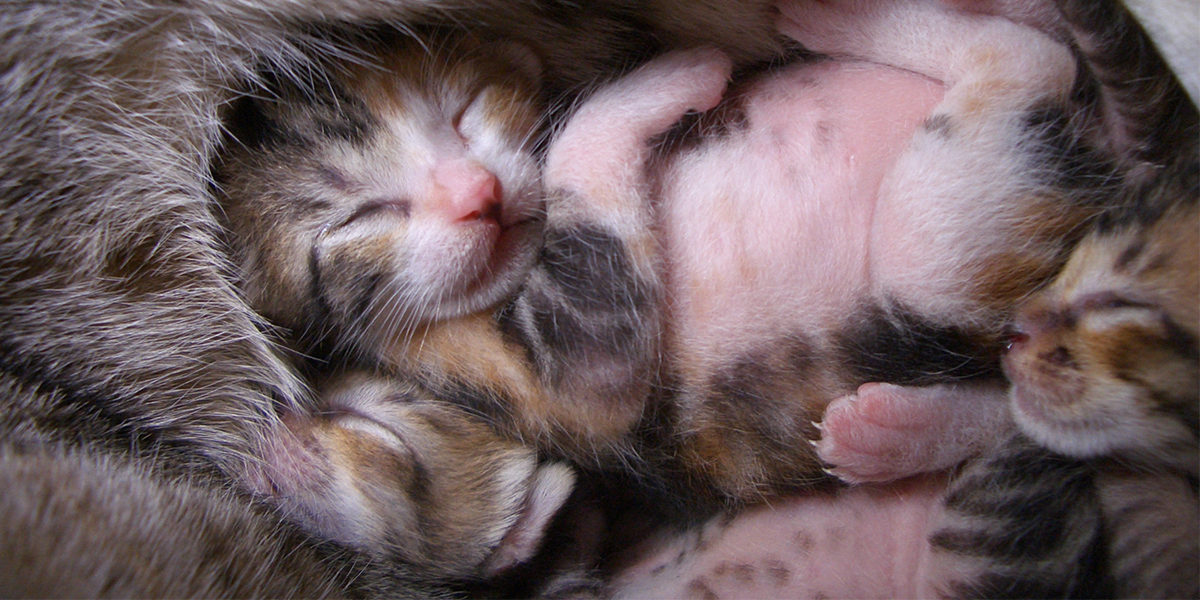Bringing a litter of kittens into the world carries great responsibility – the health and emotional wellbeing of your kittens as adults will largely depend on how carefully and sensitively you care for them in the first few weeks after birth.
They are not only growing physically from birth, they are also learning about the world and developing their own unique personalities. Raising your kittens in the right kind of environment with careful handling can help them adjust to living with humans and all the experiences this normally entails.
The development of behaviour depends both on genetic and environmental factors. Genes “programme” an individual with the potential to react in a certain way in certain circumstances. The individual’s life experiences then influence whether that behaviour is ever actually expressed and to what level. There is often an enormous difference in friendliness and general responses between littermates that can only be explained by a difference in genetic programming since environmental influences are new and relatively constant for all the kittens.
The behavioural characteristics of both the parents will influence the behaviour of their offspring but sadly, in unplanned pregnancies, it is rarely possible to choose the father! The effectiveness of the socialisation you provide for your kittens will be affected by their underlying personality types and, while timid kittens still benefit from socialisation, the overall effect in terms of interaction with people is reduced when compared to non-timid individuals.
As your kittens grow they will learn a great deal from their mother by observing her behaviour. They will also learn social and hunting skills by playing with their siblings. There is, however, a big role for you, to give your kittens positive experiences of humans so that they enjoy their lives as pet cats.
The ‘sensitive period’ for socialisation
The sensitive period of a cat’s life is the time during which particular events are especially likely to have long-term effects on its development. The key socialisation period for kittens is between two and seven weeks of age. This means that relationships that depend on familiarity are formed at this time – so humans and other species, such as dogs, may be incorporated into the cat’s social group and responded to with affection.
It is also important that kittens learn to accept non-threatening objects and activities. If kittens are reared in an environment which does not give them new things to explore or learning experiences (for example in a bare room or pen where very little happens and they have nothing to explore), they can find it hard to deal with new things later in life – this could mean that the human home is something which brings stress and fear to them in everyday life. They can be at risk of developing behavioural problems (such as urine marking) relating to anxiety and fear of things which are normal in a new home. The aim of a person bringing up a litter of kittens must be to ensure that kittens are able to take lots of new things in their stride – to introduce them to lots of things from the home environment and also to give them the ability to investigate new things with confidence.
Get them ready for life as a pet in a home with people
It is recommended that, between the age range of two to seven weeks, your kittens are touched all over, lifted frequently and gently restrained. This helps to prepare them for the form handling which is expected by most owners and reduces the potential stress of living with people. This contact should also feel positive for the kitten so all handling should be gentle, sensitive and at a time when the kitten appears receptive.
Meeting a number of different people is recommended in order to avoid acceptance of one or two individuals rather than tolerance of humans as a species. Research has shown that kittens that are handled by four or five different handlers (male, female, adults and children) before they are seven weeks of age will be more sociable to people as adult cats and more inclined to initiate social interaction with them. In comparison cats that are only handled by one individual will be particularly affectionate toward them but will view other humans with suspicion and show a tendency to avoid them.
The amount of time that kittens spend in social interaction with people is important and human handling for a total of 30-60 minutes per day, in multiple short sessions, will help to make them more confident to approach and more inclined to remain in close physical contact. Handling in the presence of the mother and littermates will also help this to be a positive experience for your kittens. However, if your female cat has been poorly socialised and reacts with hostility to the presence of people, this will adversely influence the socialisation process and it would be advisable to exclude her from the room while her kittens are being handled.
Part of the socialisation process also includes exposing the kittens to as many sights, sounds, tastes, textures and smells as might be encountered in a normal domestic home. For example,
- Vacuum cleaners, washing machine, tumble drier
- Cat carriers, baskets
- Carpets, wood floors, linoleum
- Litter materials (fuller’s earth, recycled paper, corn-based etc)
- Music, television
- Wet and dry food
- Car journeys
- A variety of furniture
Once again, all these novel objects and experiences should be presented to kittens gradually and gently to avoid overloading them with too much stimulation all at once! Choosing a time when the kitten is active and responsive, and building up the experiences gradually will undoubtedly have a more positive outcome. Remember, this is an investment in your kittens’ futures as the effort you make at this stage will help them to cope well with the challenges of everyday life.
Thank you for visiting our website, we hope you have found our information useful.
All our advice is freely accessible to everyone, wherever you are in the world. However, as a charity, we need your support to enable us to keep delivering high quality and up to date information for everyone. Please consider making a contribution, big or small, to keep our content free, accurate and relevant.
Support International Cat Care from as little £3
Thank you.
Donate Now


